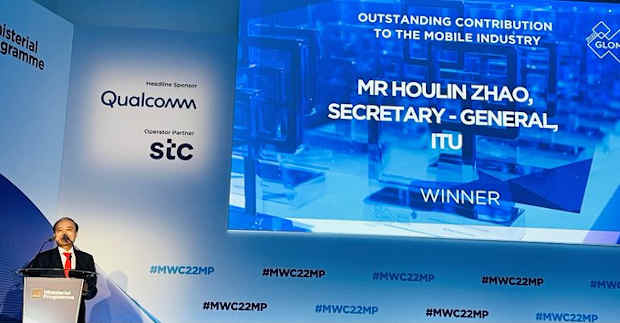ITU Secretary-General Receives Global Mobile Industry Award

The Secretary-General of the International Telecommunication Union (ITU), Houlin Zhao, received the GLOMO (Global Mobile) award from the GSMA on February 28, 2022. Photo: ITU
The Secretary-General of the International Telecommunication Union (ITU), Houlin Zhao, on February 28 accepted an award for his role in promoting mobile telecommunications as a key driver for sustainable development and improving people’s lives.
Zhao received the GLOMO (Global Mobile) award from the GSMA – representing the worldwide mobile communications industry – at the opening of the association’s Ministerial Programme at Mobile World Congress in Barcelona, Spain.
“I am honoured to accept the GSMA Award for Outstanding Contribution to the Mobile Industry,” Zhao said. “I appreciate the role that GSMA and its members play in bringing together this industry to promote telecommunications and ICTs, engage with governments, and strengthen cooperation with ITU and the United Nations.”
He has encouraged governments to work with industry players to create conducive investment conditions for information and communication technologies (ICTs), particularly to bridge digital divides and foster socio-economic progress.
Heading ITU for eight years, he has underlined the importance of four key pillars – infrastructure, investment, innovation, and inclusiveness (4Is) – to ensure people and communities everywhere benefit from cutting-edge digital technologies, including today’s rapidly emerging 5G mobile networks.
The past two years have witnessed a global surge in connectivity amid the Covid-19 pandemic, with efficient, undisrupted mobile services facilitating online education, ongoing commerce, remote work, and social interactions.
ITU – the United Nations specialized agency for ICTs – seeks to promote connectivity and harness digital development in pursuit of the UN’s Sustainable Development Goals for 2030.
“Over the years, I’ve seen at first hand the evolution of the industry,” Zhao said. “What mobile communications have achieved during the pandemic is proof of the opportunity before us now, which is to accelerate the digital transformation for all.”
While 95 per cent of the world’s population now lives within range of a mobile broadband network, important blind spots remain, particularly for rural and remote communities in Africa and Asia. Only two thirds of people with the means to connect, including through mobile broadband, are actual Internet users, according to the latest ITU statistics.
This leaves about 2.9 billion people, or 37 per cent of the world’s population, “digitally excluded”, almost entirely in developing countries.











